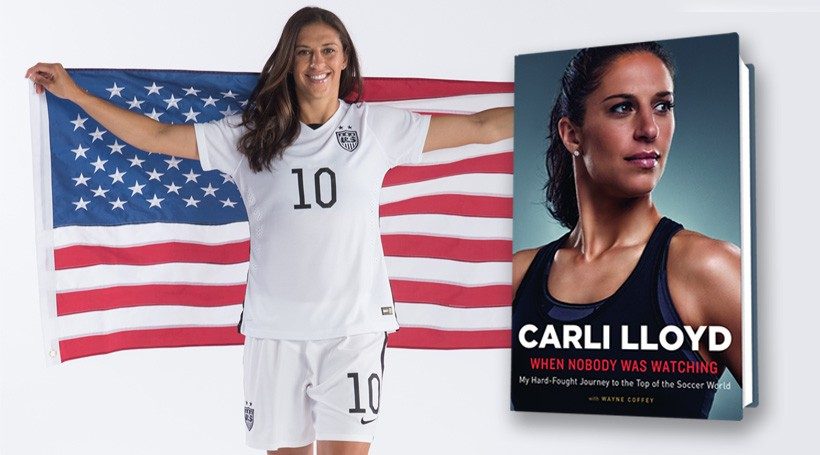The following is excerpted from WHEN NOBODY WAS WATCHING: My Hard-Fought Journey to the Top of the Soccer World by Carli Lloyd with Wayne Coffey. Copyright © 2016 by Carlilloyd.com LLC. Used by permission of Houghton Mifflin Harcourt. All rights reserved.
I don’t do fake. That’s the first thing you should know about me. I’m not one to put on airs or change my demeanor depending on where I am or who I am talking to. I don’t much care about the red carpet or being on the covers of magazines. I don’t put on makeup when I’m getting ready for a game, because why would I? I am gearing up for battle. How is mascara or eyeliner going to help me win?
If I’m not happy you can see it on my face from the other end of the Jersey Turnpike, and at the moment I am not happy. At all. I am 21 and I have just been cut from the U.S. U-21 team by a coach who told me straight out that I wasn’t national team material. My dream is to play for the U.S., and if I can’t even make the JV, what’s the point? So I am seriously considering finishing up my time with my team at Rutgers, getting my degree and calling it a career. I always thought it would be cool to be an FBI agent. Maybe I can do that. I am as adrift as a piece of flotsam in the Atlantic.
And that’s when my father, Steve, my first coach and my biggest supporter in the early years of my career, suggests I reach out to a highly regarded trainer in our area, an Australian named James Galanis.
“Maybe. I will think about it,” I say.
I do think about it. I just don’t call. I wait a week, then another…and a third. Finally, I dial this James Galanis’s number. He suggests I come down to his field so he can have a look at me. We settle on a date, a Thursday night in December, and I pull up to a deserted, dimly lit pitch in Lumberton, N.J.
James is waiting. “Let’s start with some skill work and see where you are,” he says. I think this is a colossal waste of time. But I try to be a good soldier. “Sure.”
For the next hour I audition. I juggle. I dribble in and out of poles. I demonstrate my first touch, passing, volleying, my technique on the ball with every part of both feet.
In between, James asks questions. “Why do you think you were cut? What sort of teammate are you? Do you connect with people and support others? Do you like to go on the attack? What are your strengths? Do you get back on defense?”
Almost every answer I give is full of excuses or finger-pointing. The amount of ownership I take is negligible. I don’t mind the questions, because it gives me time to rest. About 20 minutes into a one-hour session, I am gassed.
James says he wants to meet again on Saturday to do a fitness evaluation.
“This wasn’t fitness?” I ask.
“No, this was just a skill evaluation. ”
There’s something I like straight away about James. He is very clear and direct. I like the questions. I like that he doesn’t baby me.
On Saturday afternoon I report to the track at Lenape High in Medford, N.J. James wants me to do the Cooper Fitness Test, running at a steady pace as far as I can go over 12 minutes. After that I do interval work—400 meters, 200 meters, 100 meters. I go hard and do my best but, honestly, it’s not very good and I know it. As I rest, James asks more questions.
Finally, after I knock out as many sit-ups and pushups as possible in two minutes, he asks me to sit down on the red bleachers. “O.K., Carli, this is the story as I see it,” he says. “Can you make the U.S. Women’s National Team? Yes, you can. It is going to take a whole lot of work. But if you put in that work, then I don’t see any reason why you can’t go as far as you want.”
Then he provides the most detailed evaluation of me I’ve ever gotten. “You are very strong [technically and tactically]. But you are not fit. Mentally, you are weak. You don’t push yourself hard and you are lazy. You aren’t the sort of player who is going to thrive under pressure. And your character? That is poor. You make excuses and find people to blame. You always have a reason things are not working out, instead of focusing on what you can do to make them work out.”
This coach, a man who barely knows me, has just shredded me, and somehow I am fine with it. I don’t argue or push back on anything. It’s almost as if I’ve been waiting for someone like this my whole life.
Read our 2013 interview with James Galanis.
He continues. “If you keep working at 80%, you won’t get anywhere. You need to stop with the excuses. You need to start treating every training session, every game, as if it were a World Cup final. You need to be the hardest-working person out there every time. You can’t just sit behind the strikers, feed them through balls and be a one-way player. You need to play box-to-box, defend and do the dirty work.
“Soccer needs to be No. 1 in your life—not your boyfriend or your social life or anything else. Soccer. If it’s not, let’s go home right now. If I call you at 10 p.m. on a Saturday and say, ‘Meet me at the field in a half-hour,’ you turn to your friends and say, ‘Sorry, everybody, I have to go train.’ You have to be ready and willing to train on Christmas and Easter and Thanksgiving—that’s the commitment it’s going to take. If you are willing to make these sacrifices, I will work with you. I will do everything I can to help you reach your goals. It is up to you.”
My head is spinning, but in a good way. “When do we start?”
**********
The decision to take my father’s advice and meet with James turns my whole career around. I don’t quit soccer. I go into James’s Universal Soccer Academy laboratory, work harder than I ever have and make the senior national team at 23. I line up some potential endorsement deals and I am, quite suddenly, a full-fledged professional soccer player.
The only issue now: My parents are having a difficult time letting go. They have always been there for me; I won’t ever forget that. But now I’m an adult and I need to make my own decisions—and they’re having a hard time with that. They want to choose an agent for me. They are constantly on me about how I should interact with my teammates and my coaches. I know they mean well, but I feel increasingly stressed. More and more, they seem angry and resentful, as though I have closed them out of my soccer career.
In turn, I’m angry and resentful that they won’t let me be a grownup. I understand that for years our family revolved around my travels and tournaments, that my brother and sister got short shrift as a result. But I never wanted anybody to have to sacrifice because of my love of soccer.
It’s a painful predicament for me. I love my parents for their devotion. That doesn’t mean they have lifetime rights to tell me what to do. I keep trying to make this point, but it never seems to get through. This is my journey. If I fall, I have to pick myself up. If I’m not getting the playing time I want, it’s up to me to figure out why. Having something go wrong doesn’t call for a family discussion; it means I have to get better, get back to the place that will take me where I want to go—back on the training field with James.
This is all compounded by my father’s frequent critiques of my game. He was the coach who launched me on my way—of course he wants me to do well. But sometimes it’s too much.
A week after my 24th birthday, we play a friendly against Ireland in San Diego. I fly my parents out and put them up in a hotel so they can watch. Shannon Boxx, a stalwart holding mid, is out with an injury. So is midfielder Kristine Lilly. I know I’m going to have to shoulder much more of the defensive responsibilities.
We come out flying, peppering the Irish goal with shots. In the 20th minute I slip a pass down the left wing to Christie Welsh, who crosses to a charging Heather O’Reilly, who knocks it in. Cat Whitehill pounds in a rebound and we’re up 2–0 at the half, on our way to a 5–0 victory.
I meet my parents briefly after the game.
“You didn’t look like yourself,” my father says. “You’ve gone away from the creative, attacking game you’ve always played.”
“Dad, I’m playing the way the coach wants me to play,” I reply. “He wants me to be a ball-winner and be as active on defense as I am on offense.”
Neither of us is happy.
A year later, the drama goes all the way to China and the 2007 World Cup, and now it’s not just my family. We start off horribly, with a draw against North Korea, but still advance out of our group after beating Sweden 2–0 and grinding out a 1–0 victory over Nigeria. I start each game, but in the last one I get subbed off, and our coach, Greg Ryan, seems to sense my frustration over not connecting our passes or playing possession soccer. He asks if we can talk.
“I just want to check in and see how you’re doing,” he says. “I know I’ve been tough on you the last two and a half years, and I am so proud of how far you’ve come along. You are going to be the future of this team.” One second later, he informs me I will not start our first elimination game, against England.
Greg and I have had our ups and downs. There are times he seems like my biggest supporter, and other times he acts as if I don’t even belong on the team. This makes it official: I will never understand this man.
Before the England game we hold a players-only meeting and it becomes very clear how deep the frustration goes. Abby Wambach, our star striker, says we’re focusing too much on defense; we need to be more aggressive offensively. Just about everybody speaks up and the unrest is as thick as the Chinese smog. I play only 10 minutes, and I can’t say I understand why. But the mayhem is just beginning.
We advance to the semifinals against Brazil, a rising power with a collection of dazzlingly skilled women who play like jazz musicians in cleats, riffing and improvising. It is the most anticipated match of the World Cup and becomes even more so when Ryan shockingly replaces Hope Solo with Briana Scurry in goal. Hope is fuming, crushed—and it gets even worse when she learns that Kristine, one of U.S. soccer’s all-time greats, lobbied for the change, along with Abby.
We end up losing 4–0, the worst World Cup defeat in U.S. history, and I’m still trying to figure out how things unraveled so fast when I hear Hope has ripped Greg and Bri in a post-match interview. Outrage sweeps through our team and Hope is an instant pariah, isolated at our team meal and barred from our third-place game against Norway. She isn’t even allowed to fly home with the team.
Hope is summoned to a meeting with the veterans and they let her have it for breaking ranks and criticizing a revered teammate. Hope apologizes but it is not enough. They want her to pay for her breach, and then pay some more. I think this full-bore freeze-out is taking things too far. In men’s sports, people criticize coaches and managers all the time, call out teammates too, and it’s not that huge of a deal. Often the guy speaking out is even lauded for having the courage to tell the truth. When it happens in women’s sports, though, it always seems to be viewed as a nasty, claws-out cat fight. I hate that our World Cup has devolved into this, but I’m not going to be part of the Hate Hope Campaign.
James and I talk it through and he agrees. “Hope didn’t kill anybody,” he says. So I refuse to go along. I sit next to Hope. I talk to Hope. I completely disagree with this calculated crusade to crush her, and I’m not backing off that position.
This does not please the anti-Hope cabal at all. My parents are very upset that I back Hope and they blame James for giving me bad advice. “Be careful about who you align yourself with,” somebody says. “It may come back to hurt you.”
“I don’t care,” I reply. “I am going to stand up for what I think is right.”
**********
A year later, in the run-up to the 2008 Olympics in Beijing, things have never been better on the field. I’ve started all 14 games under new coach Pia Sundhage. But the drama back home in Delran, N.J., doesn’t let up.
For years my father has regarded James as all but a soccer messiah, but as I become more independent and start to make my own decisions, he begins to shift his viewpoint. My parents believe James is coming between us and they hold him responsible for my becoming an outcast in the mess that came out of World Cup 2007. As much love and gratitude as I have for my parents, I also believe all this unrest is not doing me any good. Every day I’m home it feels as if I’m tiptoeing through a minefield. I never know when someone will go off. I’m doing better than I ever have with the national team, but the discord at home weighs on me constantly. I make it a point not to spend too much time there. When I’m on breaks, I stay with friends or with my boyfriend, Brian Hollins, and that becomes a point of contention too.
“I don’t understand why you hardly ever have dinner with us and don’t spend more time with your family,” my mother says.
The fact is: Even though I love my family, home is about the last place I want to be now. I return to Jersey for a few weeks before I begin final preparations for my first Olympic Games. One night when I am out, I call home and my father answers. He starts right in on me. I don’t want to hear it.
“You never want to hear it,” he says. “Why don’t you get your stuff out of the house or I will throw it out the window?” I can’t believe it has reached this point. But true to stubborn form, I don’t back down.
“If that’s how you want it, fine,” I say.
I call Brian and tell him what happened. “I’m going to get my stuff. Can you help me?”
Brian is shocked, but he is there for me. He’s always there.
I drive over to the house, pull up in front and take a breath. I look at the side yard—my original home field. Being nostalgic is not my natural inclination, but it’s inevitable given the circumstances.
I walk in the house and head straight upstairs. This is the saddest day of my life. I begin packing up all my belongings. My mother and sister come into my room and we all start crying. I am overwhelmed. I can’t even believe this is happening.
When I’m finally finished it is almost midnight. I head to Brian’s mom’s house, weeping as I drive. It feels so final, so crushing. I’ve lived my whole life in that house. And now my own family doesn’t want me anymore. Brian comforts me as only he can. I am exhausted and utterly drained. It takes a long time to fall asleep.
**********
Days after I move out, I fly to South Korea with my teammates. In the end, we go all the way to the gold-medal game—and, fittingly enough, it’s against Brazil. I score the winning goal six minutes into overtime, with a left-footed strike inside the far post. It is the greatest moment of my soccer life to that point, an affirmation of all the work I’ve put in with James. We all get gold medals and stand atop the podium listening to the national anthem and there is nothing in the world that could be better.
I return home to Delran and there’s a parade and a big party. Nobody, of course, lets on that I’ve been tossed out of my own house. Energy is something that comes in finite supply, and James told me a long time ago that you can’t afford to waste any of it on drama. So I smile and wave and show people my gold medal, and then I go back to work. James and I have a saying: You have to empty the tank every time you’re on the field.
The moment you think you have arrived, you are in trouble.
In London, in 2012, we win another Olympic gold, and I score twice in the final game to lock it up. It’s a wonderful moment, to be sure, but my focus soon turns completely to the ’15 World Cup, a title the U.S. has not won since 1999. It is time to bring the trophy back to the U.S.—not because it is our birthright, but because we are the best team.
We struggle early in Canada, myself as much as anyone. We advance out of our group, but I am shaken to the core, deflated that I haven’t had more of an impact. James tells me to lighten up. “Nobody will remember what happened in the group stage,” he says. “Now is your time.”
When I take the field for the final, against Japan, all I’m thinking of is emptying the tank, being the hardest-working player. I am not thinking of goals, but in the third minute we have a corner kick and the play is designed for me to run onto a ground ball. It works perfectly and I flick it hard into the corner. I score again a few minutes later, and then, not long after, I control the ball at midfield and see the Japanese keeper off her line. I decide to let it fly. The goal is one of the greatest thrills I’ve ever had on a soccer field. We go on to a 5–2 victory and I am the only woman in World Cup history to have a hat trick in the final.
Read our 2015 interview with Carli Lloyd following her World Cup win.
Six months later I am honored as the World Player of the Year at a gala in Zürich, Switzerland. I share the night with Brian and James, the man who saved my career. I do not share it with my parents.
When my father had open-heart surgery, nobody told me until well afterward. When my sister got married, I was not invited. I love my family and would like nothing more than to reconcile with them. Nobody has done more for me than my parents, who devoted untold amounts of time and money that allowed me to play the game I love. It’s no exaggeration to say I never would have gotten anywhere near a World Cup, an Olympics or even the U.S. national team without them. I have never forgotten that, and I never will.
I have missed sharing all these things with them, but I hope that will one day change.












